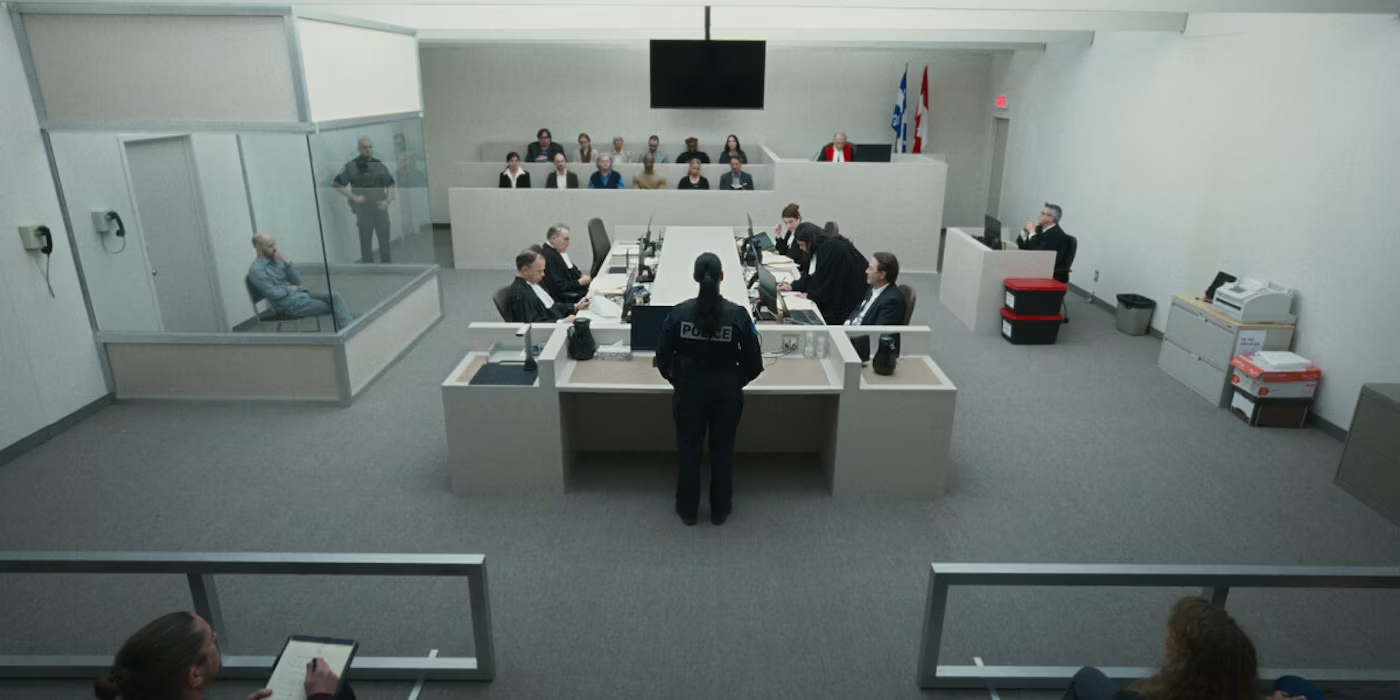
Final Rating: 4.5/5
Red Rooms is a new techno-thriller from Québécois filmmaker Pascal Plante, who’s previous film Nadia, Butterfly helped launch him into the conversation of one of the best up and coming Canadian directors. His latest film premiered last year at the Fantasia International Film Festival where it won four awards, including the top prize of Best Film in the Cheval Noir category. It currently is nominated for five Canadian Screen Awards including Best Picture, Director, Original Screenplay, Lead Performance in a Drama and Supporting Performance in a Drama.
Red Rooms begins with a twenty minute scene showing the beginning of a trial. We open on a stark white courtroom in Montreal and we learn that a man, Ludovic Chevalier (Maxwell McCabe-Lokos) is on trial for the murder of three teenage girls between the ages of 13-16, where he filmed the brutal torture he inflicted onto them, later selling the snuff films on the dark web.
The camera slowly and methodically surveils the entire room. Showing us the judge and jury members arriving, the defendant being led into a holding cell, a police officer standing on guard, the prosecutor and then the defense attorney taking turns giving opening statements. We also see a young woman seated in the crowd, watching intently.

Kelly-Anne, played by Juliette Gariépy, is solemn and blank faced. She listens to the lawyers speak while watching for reactions from both the man on trial and the mother of one of the victims. When she leaves the courtroom reporters swarm anyone willing to talk about the proceedings. Clementine (Laurie Babin) gleefully accepts the mob as she proclaims Chevalier’s innocence as she professes her love for him.
It certainly isn’t a new phenomenon. Whenever a serial killer goes on trial, throngs of female admirers seem to come out of the woodwork including those attracted to Ted Bundy, Jeffrey Dahmer, Richard Ramirez, Ted Kaczynski, Timothy McVeigh and many others. They range from denying the “accused” did anything wrong to forgiving their actions. Irregardless, they send love letters, presents and even marry these murderers.
She ends up striking up a friendship with Clementine, where Kelly-Anne’s intentions are unknown. Clem believes she has found a fellow groupie and true believer of Chevalier’s innocence, where Kelly-Anne seems to be more fascinated by her admiration of Ludovic, questioning her reasons but never voicing opposition to her thoughts.

As the film progresses we learn that Kelly-Anne is a computer whiz. She’s a model by trade but earns a living through online poker, a hobby that is numbers just like money is according to her. She also has reworked her Siri or Alexa-like home AI system to not give up her data, while also being more intelligent compared to the out of the box devices. This starts to raise questions about what Kelly-Anne’s motivations are by attending the trial everyday and her friendship with true-believer Clementine.
A key portion of the trial revolves around the police having recovered two of the three of the snuff films made, with the jury having to watch them as the killer, despite wearing a balaclava, bares a resemblance to Ludovic Chevalier and the prosecution looks to use advanced technology to prove he is the one in the videos. Clem is convinced this will absolve Ludovic as the videos were either edited to make the killer look like him or they will straight up prove it was not him at all. When Kelly-Anne lets it slip she has seen the videos, Clementine insists on watching them so she can prove to herself once and for all that she is right.
As time progresses, more and more things start to seem suspicious. Kelly-Anne becomes convinced that people are suspecting her of something. You see police whispering to members of the court, she gets fired from a modeling gig and she even goes as far as dressing up as Camille Beaulieu, one of the victims, complete with blond wig, blue contacts and Catholic school uniform. As she becomes more erratic, you wonder more and more what is her connection to the case. Does she know the families of the victims? What about the accused killer?

For people familiar with Canadian legal cases, the story of Paul Bernardo and Karla Homolka comes to mind. Was Chevalier the Bernardo equivalent and Kelly-Anne the Holmolka who was not caught? Things get even more intense when she turns to the dark web and starts chatting with mysterious strangers who claim to have the third and unearthed snuff film.
The film feels like it could have been a part of the Millenium Series written by Stieg Larsson, with Kelly-Anne as a Lisbeth Salander type, willing to go into the depths of humanity to find out the truth. Juliette Gariépy is fascinating to watch as she tries to hide and bury her emotions, deceiving the audience and those around her. When the time comes she is a ticking time bomb of potential destruction and she sells the building tension masterfully.
The score by Pascal Plante’s brother Dominique Plante causes knots in your stomach, lumps in your throat and your heart to beat through your chest. It is reminiscent of the best and most intense work by Jonny Greenwood (You Were Never Really Here and There Will Be Blood) and builds on the impactfulness of Mica Levi’s productions (Under the Skin).
Pascal Plante has made a phenomenal film, one that is in vain of The Girl With The Dragon Tattoo, Zodiac, You Were Never Really Here, Enemy, Wind River and others that are exhilarating to watch, but will crawl into your mind and refuse to leave. Forcing you to reckon with the darkest and worst aspects of humanity.
Thank you to Entract Films for the screener.




Comments
Comments are closed.